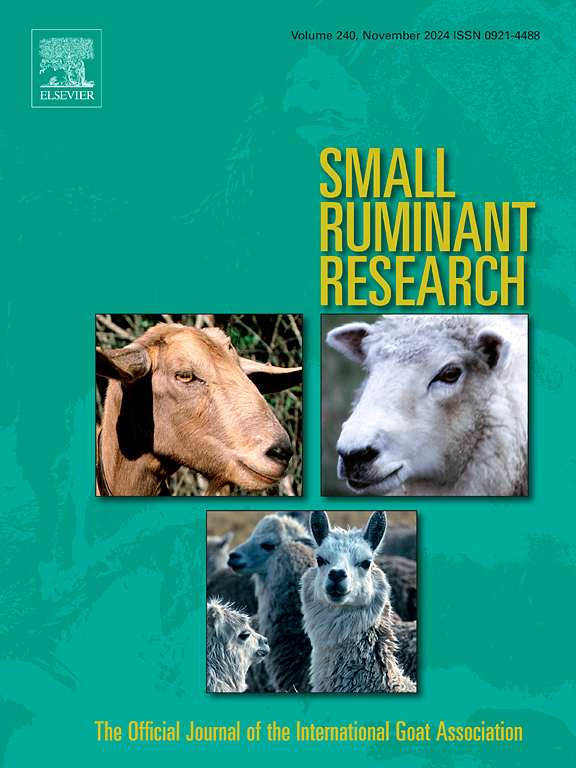Effect of heat stress and herbal products supplementation on the immune response related gene expression patterns in Kenguri ewes
IF 1.6
3区 农林科学
Q2 AGRICULTURE, DAIRY & ANIMAL SCIENCE
引用次数: 0
Abstract
The study was conducted to establish the impact of heat stress as well as the herbal products supplementation on the expression patterns of immune response related genes in indigenous Kenguri ewes. A sixty days study was carried out in a climate-controlled environment by using 24 adult female Kenguri sheep. The study animals were randomly grouped into four with six animals each, viz., C (n = 6; Control; standard diet), HS (n = 6; Heat Stress; standard diet), CS (n = 6; Control Supplement; standard diet +herbal powder), and HSS (n = 6; Heat Stress Supplement; standard diet + herbal powder). The temperature humidity index (THI) recorded clearly indicated that the HS and HSS group ewes were exposed to severe heat stress while C and CS group ewes were exposed to thermoneutral condition. Further, heat stress increased plasma cortisol concentration while the herbal supplements reduced cortisol concentration (14.72 vs 11.16 ng/ml for HS and HSS, respectively, P < 0.01). Likewise, heat stress (P < 0.05) reduced the expression patterns of Interleukin-2 (IL-2), IL-18, Tumor necrosis factor alpha (TNF-α), Interferon beta (IFN-β), Interferon gamma (IFN-γ), superoxide dismutase (SOD) and glutathione peroxidase (GPX). However, heat stress (P < 0.05) upregulated IL-6 expression. Therefore, all these cytokines can serve as biomarkers for quantifying heat stress on the immune response in Kenguri ewes. Further, the results also established that the herbal supplementation reduced the heat stress induced increased cortisol concentration and IL-6 levels (at day 60), in addition to recovering heat stress induced reduced levels of IL-2, TNF-α, IFN-γ and SOD to normal range. Thus, the herbal supplements used in this study brought beneficial effects in relieving the heat stress in Kenguri ewes.
热应激和草药产品添加对肯古里母羊免疫应答相关基因表达模式的影响
本研究旨在探讨热应激和草药产品添加对本土肯古里母羊免疫应答相关基因表达模式的影响。在气候控制的环境中,用24只成年雌性肯古里羊进行了为期60天的研究。研究动物随机分为4组,每组6只,即C (n = 6;控制;标准饮食),HS (n = 6;热应力;标准日粮),CS (n = 6;控制补充;标准日粮+中草药粉)和HSS (n = 6;热应激补充;标准饮食+草药粉)。温度湿度指数(THI)记录清楚地表明,HS组和HSS组母羊处于严重的热应激状态,而C组和CS组母羊处于热中性状态。此外,热应激增加了血浆皮质醇浓度,而草药补充剂降低了皮质醇浓度(HS和HSS分别为14.72和11.16 ng/ml, P <; 0.01)。同样,热应激(P <; 0.05)降低了白细胞介素-2 (IL-2)、IL-18、肿瘤坏死因子α (TNF-α)、干扰素β (IFN-β)、干扰素γ (IFN-γ)、超氧化物歧化酶(SOD)和谷胱甘肽过氧化物酶(GPX)的表达模式。然而,热应激(P <; 0.05)上调IL-6的表达。因此,所有这些细胞因子都可以作为量化热应激对肯古里母羊免疫反应的生物标志物。此外,结果还表明,除了热应激诱导的IL-2、TNF-α、IFN-γ和SOD水平降至正常范围外,草药补充还降低了热应激诱导的皮质醇浓度和IL-6水平升高(第60天)。因此,本研究中使用的草药补充剂对缓解肯古里母羊的热应激具有有益的作用。
本文章由计算机程序翻译,如有差异,请以英文原文为准。
求助全文
约1分钟内获得全文
求助全文
来源期刊

Small Ruminant Research
农林科学-奶制品与动物科学
CiteScore
3.10
自引率
11.10%
发文量
210
审稿时长
12.5 weeks
期刊介绍:
Small Ruminant Research publishes original, basic and applied research articles, technical notes, and review articles on research relating to goats, sheep, deer, the New World camelids llama, alpaca, vicuna and guanaco, and the Old World camels.
Topics covered include nutrition, physiology, anatomy, genetics, microbiology, ethology, product technology, socio-economics, management, sustainability and environment, veterinary medicine and husbandry engineering.
 求助内容:
求助内容: 应助结果提醒方式:
应助结果提醒方式:


